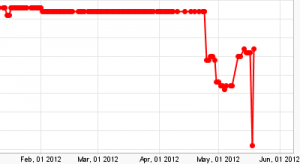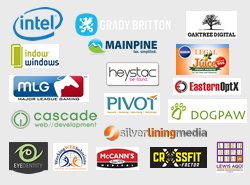What You Need to Know about Google’s Penguin Update
Although Google’s latest algorithm update — named “Penguin” — allegedly affected just 3.1% of Search queries, many business and website owners are speaking up over this major change in how search results are displayed. Some have seen traffic disappear overnight, while others have benefited from the update.
Penguin rolled out April 24th (as did several other updates that month) so if your website traffic suddenly dropped around that time, you may have been impacted by the new algorithm. While no one knows for sure what factors Google considered when adjusting rankings for Penguin, it seems clear they have penalized website owners who have purchased backlinks, or “over-optimized” their website with keyword-stuffing or other ill-advised tactics.
There have been several articles written on how to avoid Penguin-like penalties, and I’ve recapped and expanded on the best of those recommendations here.
- Stay up to date on Google’s latest updates. A good place to check for updates is Google’s Webmaster Central Blog. If you haven’t already, your site should be enabled with Google Analytics and Google Webmaster Tools. Among other things, Analytics lets you see how much traffic your site is receiving (and from where) and Google Webmaster Tools gives you more information about your websites’ visibility in Google including broken links or other issues that can negatively affect your Search rankings.
- Focus on content. Google has made it clear that it favors original, in-depth and expert content. Take the time to write content that is useful to visitors and is related to your business. How-to guides, a history of your business, a description of your service offerings and why they are superior to the competition, customer testimonials — these are all excellent sources of original content. Avoid copying manufacturer product descriptions, and never re-use text you’ve found on the Web. Starting and maintaining a blog is also an excellent way to generate original content. Once you’ve created content, don’t let it just sit there. Share it through your Facebook page and Twitter account.
- Use Social Media. As mentioned above, your content does the most good for Search rankings when it’s shared. The best way to share that content is through Social media sites like Facebook and Twitter. If you haven’t done so, create a Facebook page for your business and setup accounts on LinkedIn and Twitter. When you make updates to your blog or website, share the links socially. Have a new promotion or special? Get the word out through Facebook and Twitter so others can redistribute your content to their friends and associates. Getting active in Q&A forums like Quora is also a great way to establish yourself as a Subject Matter Expert and having a presence there can drive additional traffic to your site.
- Paid Links can Kill. Although many, many businesses purchase links from well-intended SEO companies, the simple truth is purchased links can sink a websites’ traffic in the time it takes for Google to introduce a new update. Your best long-term strategy for building links to your site is through pure white-hat activities like Social Media, guest-blogging, news or press releases, Infographics, getting active in discussion forums and by simply contacting your business partners and vendors and asking them to link to you. Reviews from customers through Google Places, Yelp, Citysearch and Yahoo Local are also effective ways to boost your websites’ rank in Local search results.
- Consider advertising with Google Adwords, Bing/Yahoo or Facebook. Paid advertising brings instant, targeted traffic and can result in a steady flow of qualified leads. Especially for new sites that haven’t established high search rankings yet, running a paid advertising campaign can be an effective way to kick-start your business on the web.
- Optimize your site. Properly optimizing your website is essential if you hope to rank in the search engines. Whether you hire a qualified Search Engine Optimization expert, or learn SEO yourself, your site should be properly optimized with target keywords. If your site has seen a recent drop in traffic, consider having a professional SEO review your site for potential problems. The investment may mean the difference between a site that ranks on page 5 of Google and one that appears in the top 5 results.


 We're based in Portland, OR, the nation's leading Search Engine Marketing community.
We're based in Portland, OR, the nation's leading Search Engine Marketing community.


